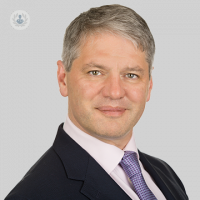Is HIFU the best treatment for varicose veins?
Written by:HIFU (High-Intensity Focused Ultrasound) is a new non-invasive way to treat varicose veins using ultrasound. There are huge advantages to HIFU over every other treatment for varicose veins that is currently available, in the cases where HIFU can be used. It is truly a 'disruptive technology'. It’s as disruptive as endovenous surgery was when it started to replace open surgery ('stripping') 20 years ago.
Professor Mark Whiteley walks us through why HIFU is one of the best ways to treat varicose veins.

Is treatment is less painful and quicker?
Patients walk into the clinic, have treatment, and walk straight back out again. Most patients do need a small amount of local anaesthetic injected directly around the vein but this is just a small volume and is much less painful than the “tumescence” currently used for endovenous surgery.
Fewer risks to patients
- Nothing is inserted into the vein and so there is no risk of anything breaking off inside the vein and potentially flying off to heart and lungs.
- Patients who are anticoagulated, who cannot have surgery on their veins for risk of bleeding, can have the veins treated from outside with absolutely no risk of bleeding.
- Patients with cosmetic thread veins or very small varicose veins, who are found to have underlying hidden varicose veins, can have the underlying hidden veins treated successfully without any surgery - even if “minimally invasive”.
- Patients with venous leg ulcers who have infections in the legs can have the veins treated straight through the ulcer using the non-invasive focused ultrasound.
The best treatment for patients with a fear of needles
Patients who are needle phobic or who do not like the pain associated with local anaesthetic injections of big volumes such as tumescence can have their veins treated with only very small amounts of local anaesthetic that can be injected with tiny needles.
Treatment is non-invasive and doesn’t require surgery
In addition, there are great advantages in the fact it can be done in an outpatient room and does not need an operating theatre. There is no need to have sterile gowns or sterile drapes as it is non-invasive. Mark Whiteley and his team are developing combination treatments of HIFU and foam sclerotherapy so that patients can have extensive treatments performed all in one go, and without the need of operating theatres or incisions.
Are there disadvantages to HIFU?
Of course, there are some disadvantages. As this treatment is new, not everybody is suitable for HIFU and some patients have to be offered other techniques such as endovenous microwave ablation. Also, because the technology is new, it still takes quite a long time to perform treatments, although this is speeding up as new treatment protocols are developed.
There are no 'side-effects' of HIFU as such, provided it is used by trained personnel using the techniques that Professor Mark Whiteley and his team are developing. However, just like any other medical intervention, there is always a possibility of complications. Luckily The Whiteley Clinic has been treating patients since May 2019 with no complications so far.
Possible complications and side effects:
As HIFU destroys veins, there will always be some tender lumps after treatment, particularly if the veins are near the surface.
- Failure to close the target vein (there has been no case of this yet, in comparison to radiofrequency and endovenous laser ablation techniques that are 95 per cent successful, meaning that 5 per cent of veins remain unclosed after those techniques)
- Temporary numbness (if it lasts for a short period and is restricted to a small area, this isn’t a major problem)
- Subcutaneous fat or muscle damage, that can cause tender lumps that take time to heal
- Deep vein thrombosis, although highly unlikely
In summary, HIFU is a disruptive technology, and without a doubt, it’s going to become one of the most sought after treatments for varicose veins and venous conditions. For patients who are suitable, it is going to have a great advantage over many alternative treatment methods.
Currently, HIFU treatment of varicose veins is only available at The Whiteley Clinic in London, where the team are developing the technique to be faster and to increase the number of patients who can have successful treatment. Protocols are very tight and complications are very rare. When HIFU is widely available, it’s essential that practitioners are well trained by the original team to prevent complications.
Arrange a consultation with Professor Whiteley via his Top Doctors profile.


